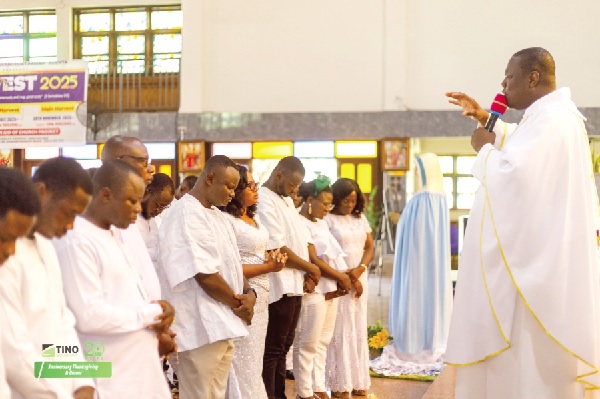The cost of solar energy components has fallen between 30 and 40 per cent worldwide over the past five years, offering a key opportunity for Ghanaians to embrace renewable energy.
This price drop is driven by significant global investments in solar innovation, advanced manufacturing technologies and economies of scale.
As a result, solar solutions have now become more affordable for households, businesses and public institutions to adopt than they were previously seen as expensive and out of reach.
This shift could reduce dependence on the national grid, boost industrial electricity availability, and help Ghana reach its goal of 10 per cent renewable energy in the national mix by 2030.
Speaking to the Daily Graphic at the 20th anniversary celebration of Tino Solution in Accra, the Chief Executive Officer (CEO) of Tino Solutions Limited, Mr Postino Dugle, stated that the affordability of solar systems also supports job creation in the renewable energy value chain, from installation to maintenance, while reducing carbon emissions and dependence on fossil fuels.
“With the current cost trend, there is no better time to invest in solar energy than now; individuals and businesses must start small and scale up gradually.
“Many clients who began with one-kilowatt systems are now operating completely off-grid,” he said.
The anniversary
The company marked its 20th anniversary with a series of activities, celebrating two decades of innovation and impact in the country’s renewable energy sector.
It used the milestone to reflect on its journey from a one-man startup in 2005 to a leading player with over 50 employees.
The celebration climaxed with a thanksgiving service and community outreach projects to demonstrate its commitment to social responsibility.
Concessionary financing
Mr Dugle stated that several local banks — including Absa, Ecobank and Fidelity — have introduced low-interest, concessionary financing packages for solar installations, helping more Ghanaians take advantage of the cost decline.
He said these initiatives were already boosting interest in renewable energy solutions, particularly as the cost of solar components had dropped by between 30 and 40 per cent in recent years.
He, however, appealed to the government to review existing import taxes and duties on solar batteries and related equipment, stressing that high tariffs continued to pose a barrier to wider adoption.
Mr Dugle added that adopting a policy similar to those in South Africa and Kenya—where taxes on solar products have been waived—would make renewable energy systems even more affordable and help Ghana achieve its 10 per cent renewable energy target by 2030.
Sustainable energy adoption
He said Tino Solutions, a leading renewable energy company, has been at the forefront of promoting sustainable energy adoption across the country.
He said over the past few years, the firm has installed more than 3,000 solar systems for households, schools and small businesses, helping to reduce dependence on the national grid and cut energy costs.
He said the company has also introduced flexible payment and leasing options to make solar installations affordable for middle-income households.
Beyond installation, he said, Tino Solutions provides maintenance and training services aimed at building local technical capacity in renewable energy management.
He said through these initiatives, the company has positioned itself as a key partner in Ghana’s clean energy transition and in driving progress toward a low-carbon economy.
Donations
As part of its 20th anniversary, Mr Dugle stated that Tino Solutions donated solar power systems to several health facilities and social institutions to improve access to reliable electricity.
He said the company installed a five-kilowatt solar system at the Katamansu Health Centre and another in a remote northern community to support maternal health services.
He said it also provided a 10-kilowatt solar system to the Weija Leprosarium to help reduce its electricity costs and sustain operations.
“These donations are our way of giving back and ensuring that vulnerable communities have access to clean and reliable power,” he added.
